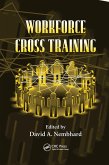Mark W Wiggins
Introduction to Human Factors for Organisational Psychologists
Mark W Wiggins
Introduction to Human Factors for Organisational Psychologists
- Broschiertes Buch
- Merkliste
- Auf die Merkliste
- Bewerten Bewerten
- Teilen
- Produkt teilen
- Produkterinnerung
- Produkterinnerung
This book provides the knowledge and skills necessary to undertake and report on human factors issues across a range of contexts.
Andere Kunden interessierten sich auch für
![Introduction to Human Factors and Ergonomics for Engineers Introduction to Human Factors and Ergonomics for Engineers]() Mark R LehtoIntroduction to Human Factors and Ergonomics for Engineers153,99 €
Mark R LehtoIntroduction to Human Factors and Ergonomics for Engineers153,99 €![Human Factors and Ergonomics in Consumer Product Design Human Factors and Ergonomics in Consumer Product Design]() Human Factors and Ergonomics in Consumer Product Design99,99 €
Human Factors and Ergonomics in Consumer Product Design99,99 €![Human-Centered Design for Mining Equipment and New Technology Human-Centered Design for Mining Equipment and New Technology]() Tim HorberryHuman-Centered Design for Mining Equipment and New Technology93,99 €
Tim HorberryHuman-Centered Design for Mining Equipment and New Technology93,99 €![Workforce Cross Training Workforce Cross Training]() Workforce Cross Training91,99 €
Workforce Cross Training91,99 €![Ergonomics for Children Ergonomics for Children]() Ergonomics for Children74,99 €
Ergonomics for Children74,99 €![Cultural Ergonomics Cultural Ergonomics]() Cultural Ergonomics88,99 €
Cultural Ergonomics88,99 €![Advances in Applied Digital Human Modeling Advances in Applied Digital Human Modeling]() Advances in Applied Digital Human Modeling102,99 €
Advances in Applied Digital Human Modeling102,99 €-
-
-
This book provides the knowledge and skills necessary to undertake and report on human factors issues across a range of contexts.
Hinweis: Dieser Artikel kann nur an eine deutsche Lieferadresse ausgeliefert werden.
Hinweis: Dieser Artikel kann nur an eine deutsche Lieferadresse ausgeliefert werden.
Produktdetails
- Produktdetails
- Verlag: CRC Press
- Seitenzahl: 446
- Erscheinungstermin: 4. Oktober 2024
- Englisch
- Abmessung: 234mm x 156mm x 23mm
- Gewicht: 621g
- ISBN-13: 9781032135595
- ISBN-10: 103213559X
- Artikelnr.: 71561021
- Herstellerkennzeichnung
- Libri GmbH
- Europaallee 1
- 36244 Bad Hersfeld
- gpsr@libri.de
- Verlag: CRC Press
- Seitenzahl: 446
- Erscheinungstermin: 4. Oktober 2024
- Englisch
- Abmessung: 234mm x 156mm x 23mm
- Gewicht: 621g
- ISBN-13: 9781032135595
- ISBN-10: 103213559X
- Artikelnr.: 71561021
- Herstellerkennzeichnung
- Libri GmbH
- Europaallee 1
- 36244 Bad Hersfeld
- gpsr@libri.de
Mark Wiggins is a Professor of Organisational Psychology at Macquarie University. He gained his PhD in Psychology from the University of Otago, New Zealand in 2001, is a Registered Psychologist in Australia with an endorsed area of practice in Organisational Psychology, and is a Fellow of the Australian Psychological Society. He has a broad range of experience that spans both scholarship and practice. As a research scholar, he is the author or co-author of over 100 publications on topics ranging from diagnostic error amongst physicians and allied health practitioners to cybersecurity in the banking and energy sectors. As a practicing organisational psychologist, Mark has acted as consultant to a number of national and international organisations, including the Clinical Health Commission, Energy Queensland, the New South Wales (NSW) Port Authority, Transport for New South Wales, and the United States Federal Aviation Administration.
Part I: Setting the Scene. 1. An Introduction to Human Factors. 2. Human
Factors in Organisations. 3. Risk and Uncertainty. Part II: Human Factors
Frameworks. 4. Human Error-Based Perspectives. 5. System Safety
Perspectives. 6. Human Engineering Perspectives. 7. Reliability-Based
Perspectives. Part III: Individual Differences and Human Factors. 8.
Information Processing. 9. Workload and Attention. 10. Situational
Awareness. 11. Human Factors and Decision-Making. 12. Fatigue. Part IV:
Group Processes and Human Factors. 13. Groups and Teams. 14. Human Factors
and Leadership. 15. Communication. 16. Resource Management. Part V: Human
Factors Tools and Techniques. 17. Hazard Analysis. 18. Cognitive Task
Analysis. 19. Accident and Incident Analysis. 20. System Evaluations,
Usability, and User Experience. 21. Human Factors and Ergonomics. Part VI:
Human Factors in Context. 22. Human Factors and Automation. 23. Human
Factors and Aviation Systems. 24. Human Factors and Energy. 25. Human
Factors and Marine Operations. 26. Human Factors and Healthcare. Part VII:
Assessment and Report Writing. 27. Human Factors Testing Methodology. 28.
Human Factors Assessments. 29. Human Reliability Analysis. 30. Human
Factors Report Writing.
Factors in Organisations. 3. Risk and Uncertainty. Part II: Human Factors
Frameworks. 4. Human Error-Based Perspectives. 5. System Safety
Perspectives. 6. Human Engineering Perspectives. 7. Reliability-Based
Perspectives. Part III: Individual Differences and Human Factors. 8.
Information Processing. 9. Workload and Attention. 10. Situational
Awareness. 11. Human Factors and Decision-Making. 12. Fatigue. Part IV:
Group Processes and Human Factors. 13. Groups and Teams. 14. Human Factors
and Leadership. 15. Communication. 16. Resource Management. Part V: Human
Factors Tools and Techniques. 17. Hazard Analysis. 18. Cognitive Task
Analysis. 19. Accident and Incident Analysis. 20. System Evaluations,
Usability, and User Experience. 21. Human Factors and Ergonomics. Part VI:
Human Factors in Context. 22. Human Factors and Automation. 23. Human
Factors and Aviation Systems. 24. Human Factors and Energy. 25. Human
Factors and Marine Operations. 26. Human Factors and Healthcare. Part VII:
Assessment and Report Writing. 27. Human Factors Testing Methodology. 28.
Human Factors Assessments. 29. Human Reliability Analysis. 30. Human
Factors Report Writing.
Part I: Setting the Scene. 1. An Introduction to Human Factors. 2. Human
Factors in Organisations. 3. Risk and Uncertainty. Part II: Human Factors
Frameworks. 4. Human Error-Based Perspectives. 5. System Safety
Perspectives. 6. Human Engineering Perspectives. 7. Reliability-Based
Perspectives. Part III: Individual Differences and Human Factors. 8.
Information Processing. 9. Workload and Attention. 10. Situational
Awareness. 11. Human Factors and Decision-Making. 12. Fatigue. Part IV:
Group Processes and Human Factors. 13. Groups and Teams. 14. Human Factors
and Leadership. 15. Communication. 16. Resource Management. Part V: Human
Factors Tools and Techniques. 17. Hazard Analysis. 18. Cognitive Task
Analysis. 19. Accident and Incident Analysis. 20. System Evaluations,
Usability, and User Experience. 21. Human Factors and Ergonomics. Part VI:
Human Factors in Context. 22. Human Factors and Automation. 23. Human
Factors and Aviation Systems. 24. Human Factors and Energy. 25. Human
Factors and Marine Operations. 26. Human Factors and Healthcare. Part VII:
Assessment and Report Writing. 27. Human Factors Testing Methodology. 28.
Human Factors Assessments. 29. Human Reliability Analysis. 30. Human
Factors Report Writing.
Factors in Organisations. 3. Risk and Uncertainty. Part II: Human Factors
Frameworks. 4. Human Error-Based Perspectives. 5. System Safety
Perspectives. 6. Human Engineering Perspectives. 7. Reliability-Based
Perspectives. Part III: Individual Differences and Human Factors. 8.
Information Processing. 9. Workload and Attention. 10. Situational
Awareness. 11. Human Factors and Decision-Making. 12. Fatigue. Part IV:
Group Processes and Human Factors. 13. Groups and Teams. 14. Human Factors
and Leadership. 15. Communication. 16. Resource Management. Part V: Human
Factors Tools and Techniques. 17. Hazard Analysis. 18. Cognitive Task
Analysis. 19. Accident and Incident Analysis. 20. System Evaluations,
Usability, and User Experience. 21. Human Factors and Ergonomics. Part VI:
Human Factors in Context. 22. Human Factors and Automation. 23. Human
Factors and Aviation Systems. 24. Human Factors and Energy. 25. Human
Factors and Marine Operations. 26. Human Factors and Healthcare. Part VII:
Assessment and Report Writing. 27. Human Factors Testing Methodology. 28.
Human Factors Assessments. 29. Human Reliability Analysis. 30. Human
Factors Report Writing.








